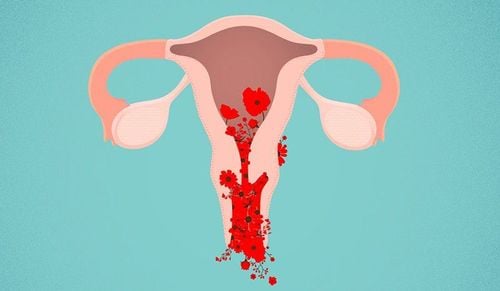Most women who have taken birth control pills are concerned about side effects such as menstrual irregularities or reduced menstrual flow caused by these medications. There are several reasons for reduced menstruation after taking birth control pills, one of which is caused by hormonal imbalance.
1. Impact of Birth Control Pills on the Menstrual Cycle
Why does menstruation decrease after taking birth control pills? In addition to factors like stress and sudden weight fluctuations, irregular periods are primarily caused by hormonal imbalances in the body. Menstrual disturbances after taking birth control pills, particularly lighter pills, can be a result of such imbalances. The main function of birth control pills is to alter hormone levels in a woman’s body, which can lead to disruptions in the menstrual cycle, including lighter or heavier periods, and even amenorrhea (absence of menstruation) after prolonged use. Specifically, birth control pills can affect:
- The duration of the menstrual cycle;
- The number of days of menstruation;
- The volume of menstrual blood (either lighter or heavier flow).
For women using continuous birth control pills, they are required to take the pill daily for 3 weeks, followed by a placebo for 1 week. Many reports show that women using this regimen often experience spotting between periods, essentially lighter menstruation after taking the pill. Additionally, after 1 year of continuous pill use, women typically experience only 4 menstrual cycles, occurring during the placebo week.
In addition to this type of birth control pill, other brands with varying dosages and compositions may cause hormonal imbalances or menstrual disturbances. However, studies also suggest that daily use of birth control pills offers benefits that outweigh the side effects, such as:
- Regular menstrual cycles occurring every 28 days;
- Shorter periods with reduced flow;
- Reduced severity of menstrual cramps;
- The ability to avoid menstruation when not wanting to have a period.
Given that the effects can vary among individuals, it is essential for women to consult with their doctor to select the most appropriate pill for their body type to avoid menstrual irregularities, light flow, or excessive bleeding.

2. Considerations When Using Birth Control Pills
It is crucial to follow the doctor’s guidance when using daily birth control pills. Key points to remember include:
- When to Start the Pills:
In addition to consulting a doctor about the most suitable type of pill, the timing and dosage of birth control should also be considered. It is generally advised to start taking hormonal birth control pills at the beginning of the menstrual cycle. After taking the pill continuously for about 25 days, the next period will occur.
- Missing a Dose:
If a woman forgets to take her daily pill, it increases the risk of ovulation occurring. Therefore, if there is a delayed period and the pill has been missed at least once, a pregnancy test should be conducted to confirm. Additionally, if two periods are missed despite consistent pill use, pregnancy should be suspected.
- Abnormal Vaginal Bleeding:
During the first 2–3 months of using birth control pills, women may experience abnormal vaginal bleeding between periods, resembling light menstruation. Birth control pills with higher estrogen content may help mitigate this issue.
- Birth Control Pills May Cause Amenorrhea:
For women who already experience light menstruation, prolonged use of birth control pills can cause thinning of the uterine lining, leading to amenorrhea. Therefore, before starting hormonal birth control, women should consult a doctor to understand the potential risks and prepare mentally to avoid confusion or anxiety.
- Heavy Menstrual Bleeding:
In contrast, some women may experience heavier bleeding during their menstrual period while on birth control pills. In such cases, it is advisable to use a birth control pill with higher progestin content.
- Abruptly Stopping the Pills:
Stopping birth control pills abruptly without consulting a doctor can lead to hormonal instability, resulting in abnormal vaginal bleeding that differs from previous menstrual cycles. In such cases, women should seek care at a specialized obstetrics and gynecology clinic for evaluation. The doctor will assess the nature of the vaginal bleeding and may perform a uterine ultrasound to determine the best course of action.
When planning for pregnancy, it is essential to stop using birth control pills and gain knowledge about fetal development during each stage to ensure better prenatal care.
Các dấu hiệu mang thai sớm không phải chỉ mỗi trễ kinh mà còn có rất nhiều dấu hiệu khác như xuất huyết âm đạo, ngực căng tức,… Điểm xem bạn biết được bao nhiêu dấu hiệu mang thai sớm thông qua bài trắc nghiệm này nhé!
3. Regulating Menstruation While Using Birth Control Pills
During the initial period of using birth control pills, a woman's body requires time to adjust to the changes caused by the medication. Women should be prepared for the possibility of side effects such as headaches, dizziness, and abdominal discomfort.
To minimize unwanted effects from using birth control pills, women should proactively adopt a healthier and more balanced lifestyle, including:
- Maintain a Balanced Diet:
Women should incorporate a variety of fruits, vegetables, and foods containing phytoestrogens—naturally occurring compounds in plants, particularly in soybeans—that resemble estrogen in chemical structure and function. Maintaining a healthy diet also helps women manage their weight and address menstrual disturbances caused by birth control pill use.
- Maintain Frequent Physical Activity:
Experts emphasize that regular exercise offers numerous benefits, especially for women. Physical activity not only helps maintain a healthy weight but also helps regulate menstruation naturally.

- Stress Management Strategies:
Women can practice stress-reducing activities such as breathing exercises, yoga, walking, listening to music, or reading books regularly. Reducing stress enhances the effectiveness of birth control pills and helps balance hormones, potentially preventing abnormal light or heavy menstruation.
- Use of Health Supplements:
Today, many health supplements designed for women contain anti-aging agents like alpha-lipoic acid, selenium, and soy isoflavones, combined with traditional remedies like Si Wu Tang, which help balance hormones and alleviate menstrual symptoms. Women should consult their doctor to select the most suitable supplement.
In conclusion, light menstruation after taking birth control pills is a common condition due to hormonal imbalance. To reduce the risk of side effects from birth control pills, women should consult with their doctor to choose the right pill, dosage, and safe usage. If women experience persistent and severe side effects such as menstrual irregularities or amenorrhea, they should seek medical advice for thorough examination and counseling.
Issues related to menstrual irregularities, including light periods after taking birth control pills, as well as other gynecological concerns, can be accurately diagnosed, screened, and assessed through the Basic Gynecological Screening Package at Vinmec International Hospital. The package includes:
- Specialized gynecological examination;
- Transvaginal ultrasound of the uterus and ovaries;
- Bilateral breast ultrasound;
- Tests such as: Rapid Treponema pallidum test, rapid Chlamydia test, collecting samples for a cervical-vaginal cytology smear, bacterial culture microscopy (female vaginal discharge), HPV genotype PCR;
- Automated urine analysis.
With Vinmec’s comprehensive services, including expert medical staff, advanced equipment, caring customer services, and absolute confidentiality, women can feel confident when signing up for the Basic Gynecological Screening Package.
Additionally, to prepare for a healthy pregnancy, both partners should undergo reproductive health checks 3–5 months before conception.
Women should:
- Preconception vaccinations (especially rubella, as rubella in pregnancy is highly dangerous).
- Genetic screening for hereditary conditions before pregnancy.
- Checking for gynecological infections that could affect maternal and fetal health.
- Women over 35 who plan to conceive (especially if it's their first pregnancy) should undergo detailed health evaluations, as pregnancy at this age carries risks such as ovarian insufficiency, preterm birth, fetal anomalies, placenta previa, and higher preeclampsia risks.
Men should:
- Reproductive health screening to detect conditions like testicular atrophy, erectile dysfunction, or poor sperm quality.
- Screening for sexually transmitted infections, especially those that are incurable and pose significant risks.
Vinmec offers a wide range of comprehensive healthcare programs for couples, pregnant women, and fetuses, including basic and advanced pre-marital check-ups, as well as comprehensive maternity care. With a team of experienced specialists in obstetrics and gynecology, IVF, stem cell technology, and genetics, Vinmec provides the most advanced reproductive care available today.
To arrange an appointment, please call HOTLINE or make your reservation directly HERE. You may also download the MyVinmec app to schedule appointments faster and manage your reservations more conveniently.
Recommended video:
What to do if you have menstrual disorders after taking birth control pills?
To arrange an appointment, please call HOTLINE or make your reservation directly HERE. You may also download the MyVinmec app to schedule appointments faster and manage your reservations more conveniently.








